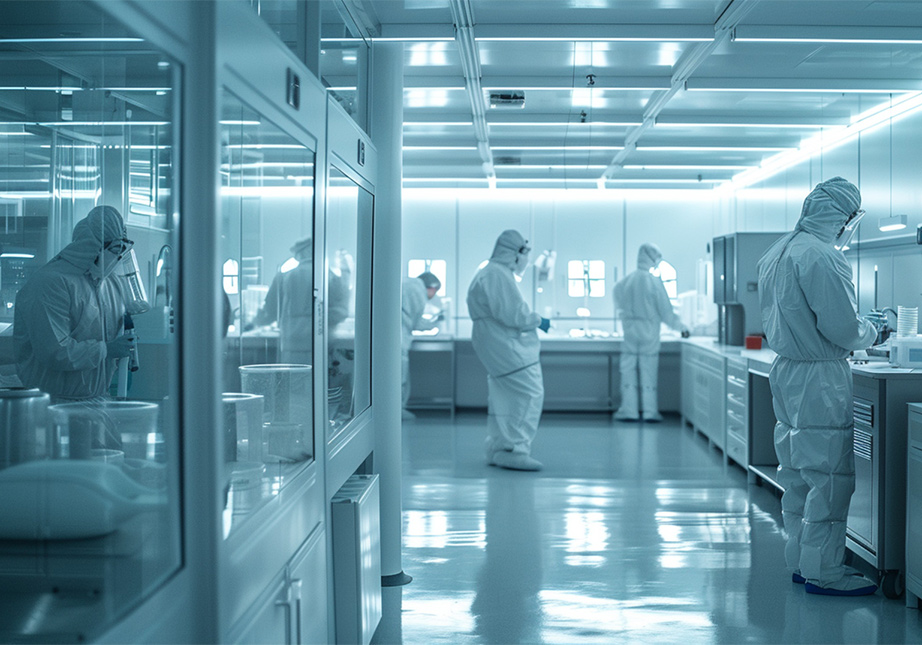
Jun 08, 2020
Forensic Science Cleanrooms
Introduction to Forensic Science Cleanrooms
Forensic science cleanrooms are specialized environments designed to prevent contamination during the examination of evidence. Unlike other cleanrooms that may cater to manufacturing or pharmaceutical needs, forensic cleanrooms are tailored to meet the stringent requirements of criminal investigations. The primary purpose of these controlled spaces is to maintain the integrity of forensic evidence, which is critical for legal proceedings.
Defining Forensic Science Cleanrooms
Forensic science cleanrooms are defined by their adherence to strict environmental standards, such as ISO Class 5/Fed Std 209E Class 100, which are essential for contamination control. These standards dictate the level of cleanliness by controlling the number of particulates in the air, ensuring that the evidence remains untainted.
Unique Aspects of Forensic Cleanrooms
Our forensic cleanrooms at G-Con differ from other types due to their specific focus on controlling static, pressure, humidity, and contamination. This level of environmental control is crucial when handling sensitive materials like DNA samples, where even the smallest contaminant can compromise the results.
Role in Forensic Analysis
The role of these cleanrooms in forensic analysis cannot be overstated. They provide a contaminant-free environment where technicians can conduct analyses such as DNA sequencing, toxicology, and fingerprinting without the risk of corrupting the evidence.
Importance of Contamination Control
Contamination control is the cornerstone of forensic science cleanrooms. Utilizing HEPA and ULPA filters, we ensure that the air within our cleanrooms maintains positive pressure, effectively removing particulates and safeguarding the integrity of the evidence. This meticulous control is what allows forensic professionals to confidently present their findings in court, knowing that their work has been protected from any external variables that could call its validity into question.
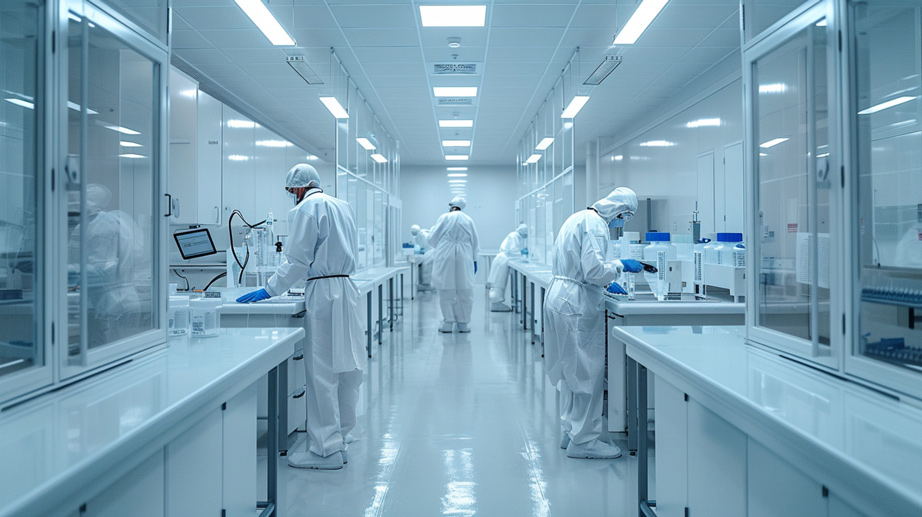
Standards and Classifications for Forensic Science Cleanrooms
Forensic science cleanrooms are governed by stringent standards to ensure the validity of evidence analysis. The ISO classifications pertinent to these specialized environments are ISO Class 5 and Federal Standard 209E Class 100. These classifications dictate the maximum allowable particulate size and concentration, providing a benchmark for cleanroom design and operation.
ISO Classifications and Forensic Analysis Reliability
ISO Class 5 cleanrooms are essential for forensic applications, as they limit particulate contamination to 3,520 particles per cubic meter of air, each 0.5 micrometers or larger. This level of control is crucial for preserving the integrity of sensitive forensic procedures, such as DNA analysis, where even the smallest contaminants can skew results.
Regulatory Framework for Forensic Cleanrooms
Specific regulations, including ISO 14644-1:2015, outline the requirements for cleanroom management and contamination control. Adherence to these standards is not only a matter of compliance but also a commitment to upholding the accuracy and reliability of forensic outcomes.
Impact of Standards on Cleanroom Design and Operation
The design and operation of forensic science cleanrooms are directly influenced by these standards. For instance, our HardWall and RigidWall cleanrooms at G-Con are engineered to meet the exacting requirements of ISO Class 5/Fed Std 209E Class 100, ensuring optimal control over environmental factors such as static, pressure, and humidity. By maintaining these standards, we provide environments that support the meticulous demands of forensic analysis, ensuring that every aspect, from airflow to filtration systems, is tailored to minimize contamination risks.
Designing a Forensic Science Cleanroom
When designing a forensic science cleanroom, key features must be meticulously planned to ensure the integrity of forensic processes. At G-Con, we understand that the layout, materials, and airflow management are critical to meet the stringent requirements of forensic analysis.
Essential Design Features
Our modular cleanrooms incorporate HardWall and RigidWall systems, providing robust environmental control. Surfaces are selected for their ease of cleaning and resistance to harsh chemicals, reducing the risk of contamination. The layout is strategically planned to facilitate a logical flow of personnel and materials, minimizing cross-contamination.
Airflow Management for Contamination Control
Airflow is a pivotal aspect of cleanroom design. Our systems utilize HEPA and ULPA filters to maintain clean air and positive pressure, effectively removing particulates. Laminar airflow patterns are established to sweep contaminants away from critical areas, ensuring a consistent and controlled environment.
Layout Considerations Supporting Forensic Processes
The layout of our cleanrooms is tailored to support the specific needs of forensic science. This includes designated areas for evidence processing, DNA analysis, and toxicology, all designed to optimize workflow and minimize contamination risks.
G-Con’s Modular Cleanroom Adaptability
Our modular cleanroom solutions offer unparalleled design flexibility to meet your forensic science requirements. Whether you’re conducting advanced genetic research or fingerprint analysis, our turnkey solutions are engineered to support a wide range of forensic applications, ensuring compliance with Class 100 standards and facilitating the stringent protocols necessary for forensic work.
Critical Equipment and Technology in Forensic Science Cleanrooms
In the realm of forensic science, the cleanroom is a bastion of precision and control. At G-Con, we recognize that the equipment within these spaces is not merely tools but the very foundation upon which the sanctity of forensic analysis is built.
Essential Equipment for Forensic Analysis
Our cleanrooms are equipped with state-of-the-art technology tailored to forensic applications. This includes HEPA and ULPA filtration systems, which are paramount in maintaining a contaminant-free atmosphere. For tasks such as DNA and fingerprint analysis, we ensure that flow hoods, whether ducted or ductless, meet the exacting standards required for accurate results.
Technological Enhancements in Cleanroom Operations
Advancements such as MALDI-TOF lasers and Supranano particles are facilitated within our cleanrooms, enabling cutting-edge research and analysis. These technologies require the precise environmental conditions that our modular cleanrooms provide.
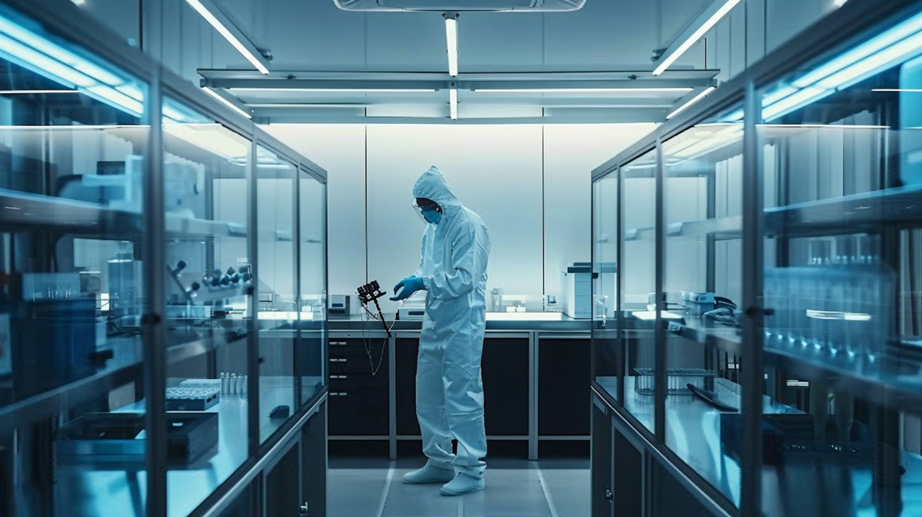
Role of Equipment in Contamination Control
Each piece of equipment, from the cyanoacrylate fuming chambers essential for fingerprint analysis to the cleanroom canisters and wipes, plays a critical role in maintaining a sterile environment. Our cleanrooms are designed to integrate these technologies seamlessly, ensuring that contamination control is a constant, unwavering standard.
Integration of Advanced Technology by G-Con
We at G-Con are committed to incorporating the latest advancements in our modular cleanroom solutions. Our cleanrooms are Factory Acceptance Tested, with configurations that support the diverse needs of the forensic science community. By staying at the forefront of cleanroom technology, we provide environments where meticulous evidence analysis can proceed with unimpeachable integrity.
Contamination Control Strategies in Forensic Science Cleanrooms
Contamination control is the cornerstone of forensic science cleanrooms. At G-Con, we implement rigorous strategies to ensure the integrity of evidence remains uncompromised.
Training for Contamination Prevention
Our personnel undergo extensive training in contamination control, emphasizing the importance of proper cleanroom conduct and the use of personal protective equipment (PPE). This training is designed to instill a deep understanding of how contamination affects forensic analysis and the best practices to prevent it.
Monitoring Techniques to Ensure Cleanliness
We employ advanced monitoring techniques to detect any deviation from the required cleanroom standards. This includes regular testing of air quality and surface cleanliness to ensure that our cleanrooms consistently meet ISO Class 5/Fed Std 209E Class 100 standards.
G-Con’s Commitment to Contamination Control
Our cleanrooms are equipped with HEPA and ULPA filters, crucial in maintaining clean air and positive pressure, which are key to removing particulates. The design of our cleanrooms, including airflow patterns and material selection, is focused on minimizing contamination risks, ensuring that every procedure within our cleanrooms is conducted in a controlled environment.
By adhering to these stringent contamination control measures, we at G-Con provide you with the assurance that your forensic analyses are conducted within the highest quality cleanroom environments.
Operational Protocols and Training
In forensic science cleanrooms, adherence to operational protocols and comprehensive training are paramount. At G-Con, we ensure that our cleanroom technicians are well-versed in the standard operating procedures (SOPs) that are critical to maintaining the integrity of forensic analyses.
Standard Operating Procedures in Forensic Cleanrooms
Our SOPs encompass a range of activities, from the correct donning of personal protective equipment (PPE) to the meticulous handling and processing of forensic samples. These procedures are designed to prevent contamination and preserve the chain of custody, which are essential for the admissibility of evidence.
Training for Cleanroom Technicians
Technicians in our cleanrooms receive rigorous training that covers both the theoretical and practical aspects of forensic science. This includes understanding the nuances of various forensic analyses and mastering the use of specialized equipment within the controlled environment of a cleanroom.
Qualifications for Forensic Cleanroom Personnel
Personnel working in our cleanrooms possess qualifications that demonstrate a proficiency in both cleanroom operations and forensic procedures. This dual expertise ensures that every analysis is conducted with precision and in compliance with legal standards.
Continuous Training and Forensic Integrity
Ongoing training is a cornerstone of our commitment to excellence. By keeping our technicians abreast of the latest forensic methodologies and cleanroom technologies, we reinforce the reliability and credibility of the forensic analyses conducted within our facilities.
Maintenance, Monitoring, and Safety in Forensic Science Cleanrooms
Maintaining the pristine condition of forensic science cleanrooms is critical for the accuracy of evidence analysis. At G-Con, we adhere to best practices that ensure our cleanrooms remain compliant with the highest standards.
Best Practices for Cleanroom Maintenance
Regular maintenance schedules are crucial. Our protocols include frequent cleaning with appropriate agents and equipment, ensuring surfaces are free of contaminants. We also replace consumables, such as cleanroom wipes and canisters, to maintain a sterile environment.
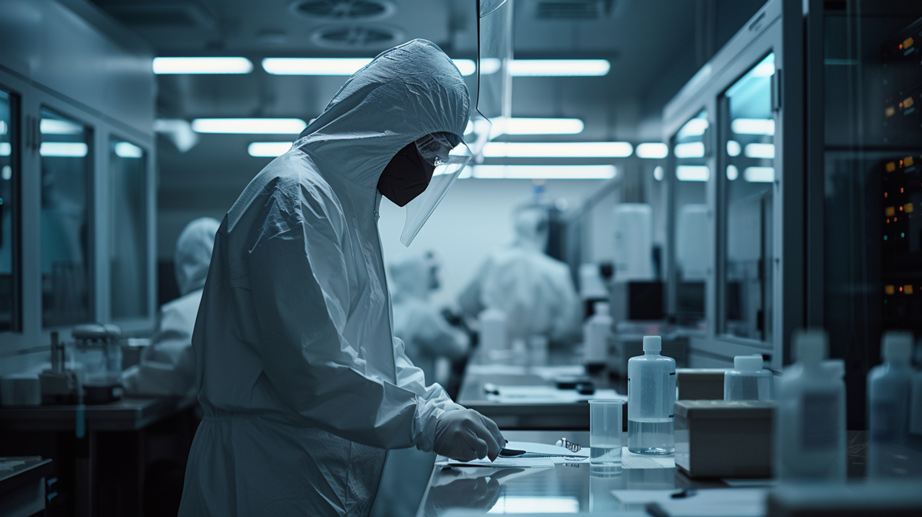
Monitoring Cleanroom Integrity
Continuous monitoring of cleanroom conditions is implemented to detect any deviation from set parameters. This includes real-time tracking of particulate levels, temperature, and humidity, using advanced sensors and control systems.
Safety Protocols for Hazardous Materials
Safety is paramount. Our cleanrooms are equipped with features like ducted fume hoods and cyanoacrylate fuming chambers to safely handle hazardous materials. Personnel are trained in the proper use of personal protective equipment (PPE) and decontamination zones.
Impact of Protocols on Forensic Results
The reliability of forensic results is directly linked to the maintenance and safety protocols of the cleanroom. By ensuring a controlled environment, we guarantee that the forensic analyses you conduct are of the highest integrity, meeting the rigorous demands of both scientific and legal scrutiny.
Cost Considerations and Budgeting for Forensic Science Cleanrooms
When planning for a forensic science cleanroom, understanding the financial implications is crucial. As procurement managers or cleanroom technicians, you’re tasked with balancing the budget without compromising on the quality and compliance of the cleanroom environment.
Budgeting for Cleanroom Operations
Effective budgeting requires a comprehensive view of both initial setup costs and ongoing operational expenses. This includes the cost of modular cleanroom components, specialized equipment like HEPA and ULPA filters, and the necessary safety measures such as PPE and waste disposal systems.
Long-Term Financial Benefits
Investing in a high-quality cleanroom has long-term benefits. It ensures the integrity of forensic analyses, which can save costs associated with retesting or compromised evidence. Additionally, a well-maintained cleanroom extends the lifespan of sensitive equipment, reducing the need for frequent replacements.
G-Con’s Modular Cleanroom Solutions
Our modular approach at G-Con is designed to be cost-effective. By providing turnkey solutions that are adaptable to your specific needs, we help you avoid the expenses associated with custom-built structures. Our cleanrooms are designed for scalability, allowing you to expand as needed without incurring the high costs of traditional construction.
By considering these cost factors and working with G-Con’s modular solutions, you can establish a forensic science cleanroom that is both financially viable and compliant with the stringent standards required for forensic analysis.
Legal and Ethical Considerations in Forensic Science Cleanrooms
Forensic science cleanrooms must adhere to a rigorous legal framework to ensure the admissibility of evidence. At G-Con, we recognize the gravity of these legal standards and the ethical obligations they entail.
Compliance with Legal Standards
Our cleanrooms are designed to meet the requirements of ISO 14644-1:2015 and Federal Standard 209E Class 100, ensuring that the conditions within our facilities comply with the legal prerequisites for forensic analysis. This compliance is critical, as it directly affects the legal outcomes associated with the evidence processed within these environments.
Ethical Handling of Forensic Evidence
Ethical considerations are embedded in every aspect of our cleanroom operations. We understand that the handling of forensic evidence carries significant weight in legal proceedings. Therefore, our protocols are structured to prevent any form of contamination that could call into question the integrity of the evidence or the ethical standards of the forensic process.
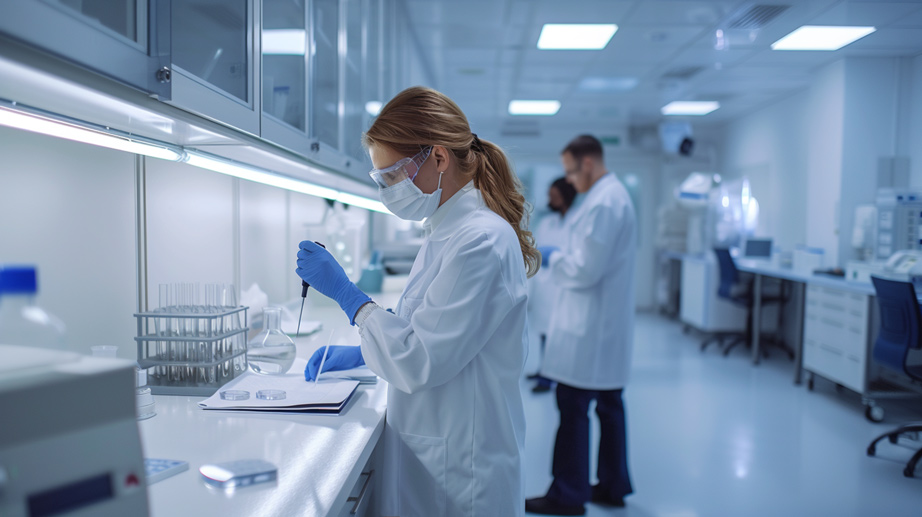
Impact on Legal Outcomes
The standards upheld within our cleanrooms play a pivotal role in the legal process. By ensuring that our facilities and operations meet the stringent criteria set forth by governing bodies, we contribute to the reliability and credibility of the forensic evidence, which is paramount in the pursuit of justice.
Our commitment at G-Con is to provide cleanroom solutions that not only meet the technical and operational requirements of forensic science but also uphold the legal and ethical standards that are essential for the integrity of the field.
Challenges and Solutions in Forensic Science Cleanrooms
Forensic science cleanrooms face unique challenges that can impact the integrity of evidence. At G-Con, we are dedicated to addressing these challenges with innovative solutions.
Addressing Contamination Risks
One of the primary challenges is contamination control. To address this, we implement rigorous protocols for air filtration and circulation, utilizing HEPA and ULPA filters within our modular cleanrooms. This ensures a consistent environment that meets ISO and Federal Standards for cleanliness.
Modular Cleanrooms Overcoming Operational Challenges
Our modular cleanrooms provide a flexible solution to the spatial and environmental challenges of forensic analysis. They are designed with scalability in mind, allowing for quick adaptation to the evolving needs of forensic science without the downtime associated with traditional construction.
Role of Continuous Innovation
Continuous innovation is key to solving operational challenges in forensic science cleanrooms. We integrate the latest advancements, such as automation and control systems, to enhance cleanroom management. This includes incorporating Building Management Systems (BMS) and Environmental Monitoring Systems (EMS) for advanced oversight and control.
By proactively addressing these challenges, we ensure that your forensic analyses are conducted in an environment that upholds the highest standards of evidence integrity and operational excellence.
Emerging Trends in Forensic Science Cleanroom Technology
The landscape of forensic science cleanrooms is continually evolving, with new technologies enhancing the precision and efficiency of forensic analyses. At G-Con, we stay abreast of these developments to ensure our cleanrooms meet the cutting-edge demands of the field.
Innovations Impacting Cleanroom Design
Emerging trends include the integration of automation and advanced environmental monitoring systems. These innovations promise to refine the control we have over cleanroom conditions, directly impacting the design and operation of these critical spaces.
Challenges Addressed by Technological Advancements
Future innovations aim to solve challenges such as reducing the risk of contamination and streamlining forensic workflows. For example, advancements in air filtration technology and materials science contribute to creating environments that are even more conducive to meticulous forensic work.
Adaptation to Technological Advancements
The forensic science field is adapting to these advancements through the adoption of modular cleanroom designs that can easily incorporate new technologies. This adaptability ensures that forensic laboratories remain at the forefront of scientific investigation, ready to embrace the next wave of cleanroom technology.
By anticipating and integrating these trends, we at G-Con are committed to providing you with cleanroom solutions that not only meet today’s standards but are also poised to adapt to tomorrow’s innovations.
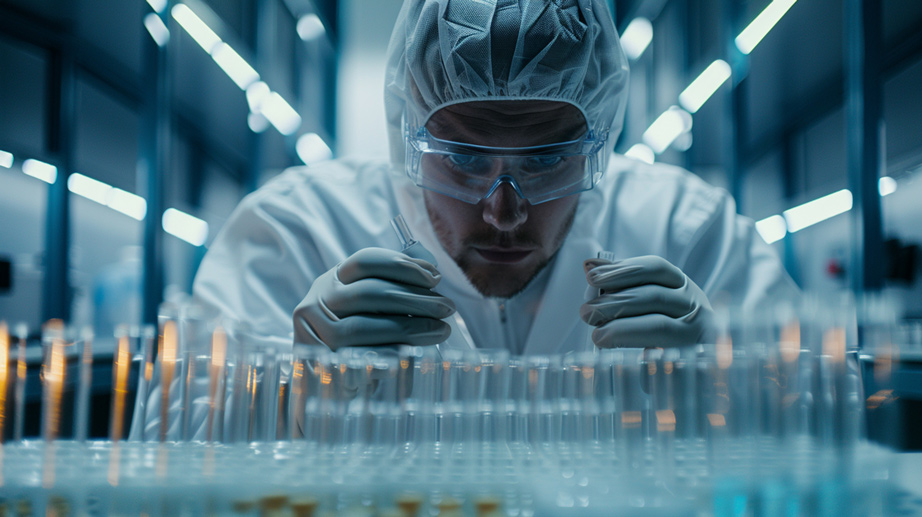
Tailored Modular Cleanroom Solutions for Forensic Science
At G-Con, we specialize in providing modular cleanroom solutions that cater specifically to the rigorous demands of forensic science. Our cleanrooms are designed with precision, ensuring that every aspect of your forensic analysis is conducted within an environment that meets the highest standards for contamination control.
Unique Approach to Cleanroom Design
What sets our approach apart in the cleanroom industry is our commitment to flexibility and customization. Our HardWall and RigidWall cleanrooms are engineered to provide optimal control over environmental factors such as static, pressure, and humidity, which are crucial for forensic applications.
Engaging with G-Con for Your Cleanroom Needs
If you’re interested in learning more about our cleanroom solutions, we invite you to get in touch with us. Our team of experts is ready to provide you with detailed information and consultation to ensure that your cleanroom is perfectly suited to your forensic science needs.
Choosing G-Con for Forensic Science Cleanrooms
Choosing G-Con for your cleanroom needs means selecting a partner dedicated to quality and compliance. Our turnkey solutions are not only designed to meet the specific environmental needs of forensic science but also to ensure that your operations are efficient and your evidence handling is beyond reproach. Contact us to discover how our cleanrooms can be the foundation of your forensic science success.